24/7 VALENCIA: Can you tell us about the first-hand experience of doing Rally?
SANTIAGO CAÑIZARES: I’ve always enjoyed driving racing cars since I started out playing football. When my football career came to an end, it’s when I could permit myself to take this risk and make being a rally car racer a reality and also dedicate time to it. Independent of the speed you are going or your individual aptitude, it really is an emotional experience.
How do you find Valencia as a city to live?
Valencia is a beautiful city and also very welcoming too. I had the good fortune to play for Valencia CF for the 10 years that were the most glorious of the club’s history and it also means that I receive the cariño of the local people, that has always been reciprocal. I feel very happy here.
What did you learn from the Claudio Ranieri era?
In 1998-99, Ranieri put a lot of hard work into getting the team going. We worked a lot and very well under him. He was demanding of all of us and he created the foundation that led to the success of that decade with winning the Copa del Rey in 1999. It was a fantastic year.
Tell us about your memories of the Copa del Rey of 1999…
Winning the Copa del Rey in 1999 was a tremendous milestone because it ended the bad run of Valencia CF not having won any titles for 20 years.
Also, it was a Cup that was won with a lot of merit. We eliminated Barcelona, Real Madrid and Atlético Madrid in the final three rounds (quarter-final, semi-final and the final). Theoretically, they are the three best teams that we have in Spain and we beat them all… and not just well but brilliantly.
It was a cup that was much needed for ‘El Valencianismo.’ It was marvellous to be there. Winning that Cup was an objective realized. After having signed for Valencia, my aspiration was to break Valencia’s bad run of no titles for 2 decades.
Can you explain the enormous success of Valencia CF in the Rafa Benitez era of 2 leagues and an UEFA?
Benitez arrived in Valencia after the good work of Ranieri and Cuper. With Cuper, we were twice finalists in the Champions League and this gave the team a lot of experience. To learn how to lose before you learn how to win is fundamental.
Benitez found a squad that was very committed and very driven to succeed. As a manager, he gave us a lot. He had a great talent to tactically organize the team and execute his ideas successfully. He also had an excellent backroom staff. We had a superb physical trainer in Pako Ayestarán who always maintained us at a really high level of fitness and was the best in La Liga. We had a great assistant manager and goalkeeping coach too.
The whole unit joined together with a lot of talent and individuals doing their job very well. Also, the club itself was being run smoothly and this transmitted a lot of tranquility from the offices to the squad.
So, there were a lot of components that formed the success of that era. I very much enjoyed those three years with Benitez.
Are the fans who support Valencia CF at Mestalla unique?
Yes. Speaking for myself, the fans are unique. They have never abandoned their team even when it was at its worst in classification in La Liga. Mestalla has been faithful and being ‘fiel’ is the best attribute that supporters can have for their team. They go to the stadium and never turn their back on the team. Depending on your performance, you receive applauses or boos but it is in your hands as a footballer how you want to be treated at Mestalla. The important thing is that, when you go to the Mestalla, the fans are accompanying you and are right there with you.
In the Cuper era, what do you remember of those wonderful Champions league matches that led to the finals?
Cuper did a magnificent job. He was a manager who was very demanding too. Despite a bad start in his first season, he was able to successfully recuperate the team that, having won the Copa del Rey in 1999, perhaps started the new season somewhat relaxed. He managed to turn this situation around and managed to get the team performing very well and came very close to getting Valencia CF achieving what would have been the greatest titles in their history.
We had never been as strong in Europe as we were when we were with Cuper. There were marvellous Champions League matches at Mestalla that the fans enjoyed. Indeed, this placed Valencia CF in Europe as a club that did things very well and that, with far less of a budget of the bigger teams in European football, were capable of competing at the same level as them. Of course, Cuper managed this whole situation in an effective way.
What happened to Valencia CF against Real Madrid in Paris in the 2000 final?
In Paris, it was our first final. Real Madrid had been Champions just a few years before. Perhaps the first time you go to play such an important match, everything is a surprise. Real Madrid were much more prepared, mentally, than we were… and it showed. This grand occasion was noticeably the first time for us.
We didn’t have strength in depth as a squad. We had injuries in the team that we couldn’t solve in a way that could give the team the balance it needed for this type of match. We didn’t arrive in the best form. We had made a great effort in the Champions League tournament throughout the temporada…
There were players who very tired at the end of a demanding season. For example, Kily González sprained his knee the week before but still played in Paris. Farinós played the final very overstretched and with a fibula fracture of sorts. But we had to play a final and, with a limited squad, everyone wanted to compete. We were overcome but we learnt from the experience. The final just wasn’t at the appropiate time for us. Had it been played 15 or 20 days before…it would have suited us better. Having said that, to play that Champions League final was a fundamental experience for Valencia CF.
Why did Valencia lose to Bayern Munich in the 2001 final?
Meanwhile, against Bayern it was another thing. Before the final, Valencia were much more prepared mentally for the match and were more competitive too. We were without some of the distractions of all the noise of reaching the final the previous year. We were much more responsible, more mature and had more expertise this time around. We competed very well, we competed to win and we were winning for large sections of the final and even including during the penalty shoot-out…
However, we came up against a Bayern Munich who never gave up and never accepted the possibility of defeat and that makes a team that is very difficult to beat. Also, in the penalty shoot-out there emerged the figure of Oliver Khan. He’s a goalkeeper with a lot of personality who was capable of shining at the right time to win the title for his team.
I am extremely proud to have played the final and the way that we competed. Obviously, I’m also aware that it was an historic occasion for Valencia CF to win the Champions League final and, unfortunately, we lost it.
The rest of the Champions League finals I have watched on television. What do I mean by that? I mean that in the following years, Valencia has not managed to reach the Champions League final. It can never be a problem for me to look back on those 2 finals because we got to them on merit and being very competitive. Despite the defeats in both finals, it can never be a problem for Valencia as Valencia CF grew as a club and grew in prestige and their players grew too. I’ve always said “Ojalá” we get to another Champions league final even if we lose because it is glorious what the club achieves each time it competes to get so far in the Champions League.
Of course, it was gutting to lose the 2001 final but the Valencia players gained an enormous amount of recognition. Of course, competing against a team like Bayern Munich is very tough and only one of the 2 teams can win. As I said before, Valencia were ahead during some of the match but in the decisive moment of the penalty shoot-out, Bayern were more successful.
In my opinion, there weren’t any errors in this match. I believe that Valencia as a team played well. What happens is that when you play in a Champions League final you play against great teams… and it is very difficult to win.
Can you choose your top 11 Valencia CF team with yourself in goal?
That’s a really difficult one. Valencia CF has over 100 years of history so it’s complicated to elaborate a top eleven from different epochs of the club’s history. I have played with some great players in Valencia. Defenders like Ayala, Pellegrino, Angloma, Carboni, Camarasa. I saw Ricardo Arias play too.
The midfielders like Mendieta, Baraja, Albelda, Kily González have been extraordinary and Silva too. I’ve seen Fernando Gómez play and Claramunt too.
For strikers, I would include Villa and, obviously, Kempes. Without doubt, he is emblematic of the club. It’s very difficult to do a top eleven but you will notice that the majority of the players I have mentioned… I have actually played with. So, that’s a real honour.
How do you see Valencia CF today?
Personally and, speaking sincerely, I don’t like that Valencia was sold to a foreign investor.
In the good hands of a great footballing professional like Mateu Alemany, who I backed, the club got the stability it needed. I have been proved right as Valencia CF won the Copa del Rey final and got back in to the Champions League while he was at the club.
But when the club is not in the hands of great professionals and the majority of the choices are experiments and there is not a clear direction…what happens is that is very difficult for the team to perform at 100 % since the Lim mandate took over. However, I’m hoping that I turn out to be wrong about this…
Can you tell us more about your television work in the world of football?
I’m comfortable with Radio & Television in the world of football. I’m free to express myself at liberty. I believe that the public accepts, more or less, that my opinons are independent but expressed with respect and I try to be objective as I try to explain the whys and wherefores of each particular situation from my experience in football. I don’t aim to offend anybody or defend unjust situations that I see either. I’m sorry if I do upset people but I can only transmit to others what I see with my own eyes in football.
Does being a goalkeeper necessitate a different kind of mentality and physique than an outfield footballer?
Yes. A goalkeeper needs a different type of physique and a different way of training too. The mentality has to be one of absolute concentration. I’ve always said that the most important quality of a keeper is their personality.
Those goalkeepers that are capable to get through intense periods of a match without being perturbed by anything are the ones who get really far. As I have said before, it is very difficult to achieve this as there are a lot of distractions for a keeper during your day-to-day training as a professional and even more so on the pitch when you have a lot of time to think. I have always said that distraction is a goalkeeper’s worst enemy.
What are your best memories of being goalkeeper for Spain?
In general, my memories of playing with the national team are really good. To be chosen to represent Spain, which is the objective of all Spanish players who are competing to represent the national team…well, I’m proud to have played for Spain. Regarding the best moments, there are two key matches I remember. Firstly, to win the Olympics for Spain in 1992 in Barcelona with a fantastic team. It was an unforgettable Olympics and it was the only time that Spain won the Olympic gold medal in football and it was special that we won it in Spain too.
My debut for Spain was a match with a lot of tension as it was the last match to try and qualify for the 1994 World Cup (U.S.A) tournament. The goalkeeper Zubizarreta was sent off and so I had to substitute him. I didn’t have time to think and reflect and enjoy my debut for Spain. I had to get cracking as we were down to 10 men and we had to win to qualify, which we achieved. For this reason, my debut turned out to be a marvellous day and it changed my life…
Interview by Will McCarthy
Article copyright ’24/7 Valencia’
Related Post
This site uses Akismet to reduce spam. Learn how your comment data is processed.


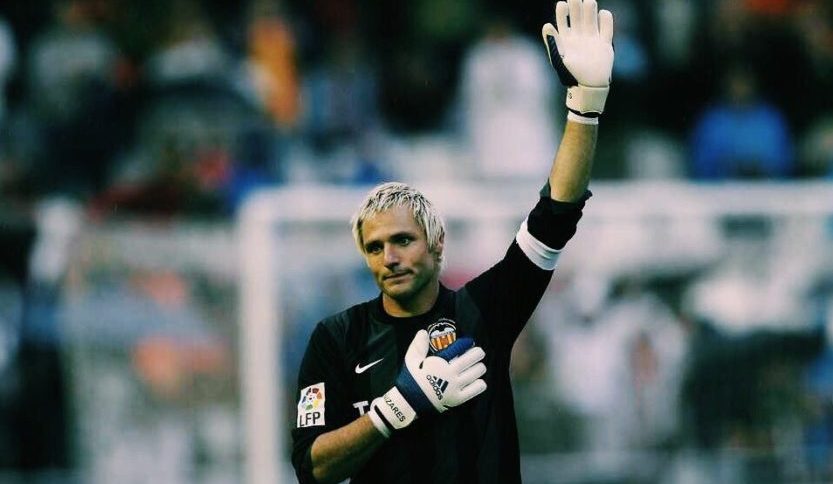
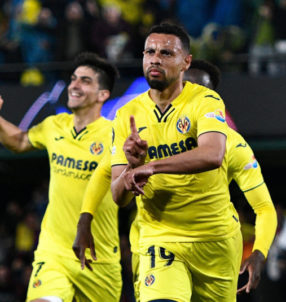
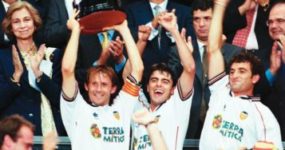
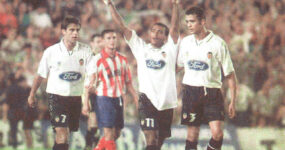
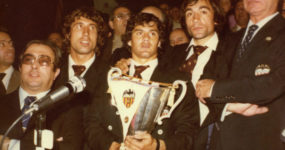


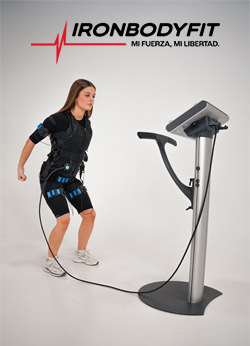
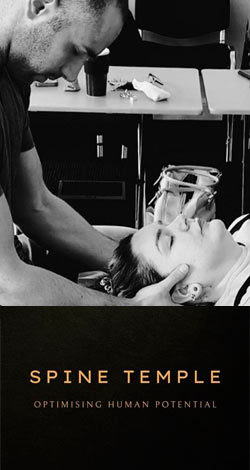















Leave a comment